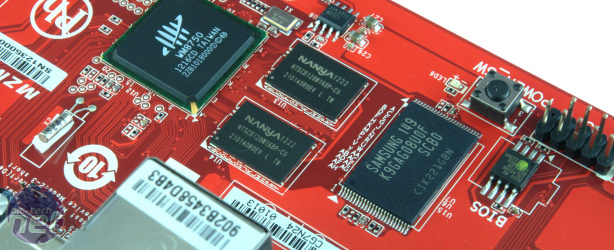VIA APC8750 review
November 13, 2012 | 10:45
Companies: #arm #debian #raspberry-pi #via #wondermedia

The APC is, no doubt, a remarkable achievement. VIA has managed to develop its own single-board computer - albeit one based on a bought-in processor - in a very short amount of time, and learned from its rivals to avoid some launch-day disasters - FCC and CE certification marks are present and correct on the board at launch. The performance is also on-par with rival devices, easily equalling the Raspberry Pi in general-purpose compute, and the neo-ITX form factor opens it up to new use cases.
Sadly, it feels like VIA may have rushed the product in order to get it to market as soon as possible. The software is appalling, and the documentation on VIA's official APC website notable in its absence. Nowhere, for example, will you discover that the power supply needed by the European APC is a 9V centre-pin positive model - a critical piece of information, without which it's perfectly possible to pop your new toy and release the magic smoke.
The user forums can help, but are a ghost town compared to those of the BeagleBoard or the Raspberry Pi. A question about the power supply needed went ignored until we reached out to VIA's press team ourselves, and remains the only place to find the PSU information needed by European buyers.
In time, many of these criticisms will be rendered invalid. The software will improve - or be replaced outright with a pre-installed version of Raspbian - and the community will grow. The documentation, too, will be brought up to scratch either by VIA or by the community. It's what we've seen with the Raspberry Pi, which has gone from a badly-documented project understood only by a handful of engineers to a near pick-up-and-play device with a thriving community.
For now, however, the APC is hard to recommend for most users. For those who like to tinker, however, its low price - around £10 more expensive than a Raspberry Pi, but still comfortably under £50 even when postage and packing is taken into account - means it could be worth a punt in the hopes of a community-led breakthrough making it a more usable alternative to the Pi.
Sadly, it feels like VIA may have rushed the product in order to get it to market as soon as possible. The software is appalling, and the documentation on VIA's official APC website notable in its absence. Nowhere, for example, will you discover that the power supply needed by the European APC is a 9V centre-pin positive model - a critical piece of information, without which it's perfectly possible to pop your new toy and release the magic smoke.
The user forums can help, but are a ghost town compared to those of the BeagleBoard or the Raspberry Pi. A question about the power supply needed went ignored until we reached out to VIA's press team ourselves, and remains the only place to find the PSU information needed by European buyers.
In time, many of these criticisms will be rendered invalid. The software will improve - or be replaced outright with a pre-installed version of Raspbian - and the community will grow. The documentation, too, will be brought up to scratch either by VIA or by the community. It's what we've seen with the Raspberry Pi, which has gone from a badly-documented project understood only by a handful of engineers to a near pick-up-and-play device with a thriving community.
For now, however, the APC is hard to recommend for most users. For those who like to tinker, however, its low price - around £10 more expensive than a Raspberry Pi, but still comfortably under £50 even when postage and packing is taken into account - means it could be worth a punt in the hopes of a community-led breakthrough making it a more usable alternative to the Pi.
-
Overall70 / 100


MSI MPG Velox 100R Chassis Review
October 14 2021 | 15:04









Want to comment? Please log in.